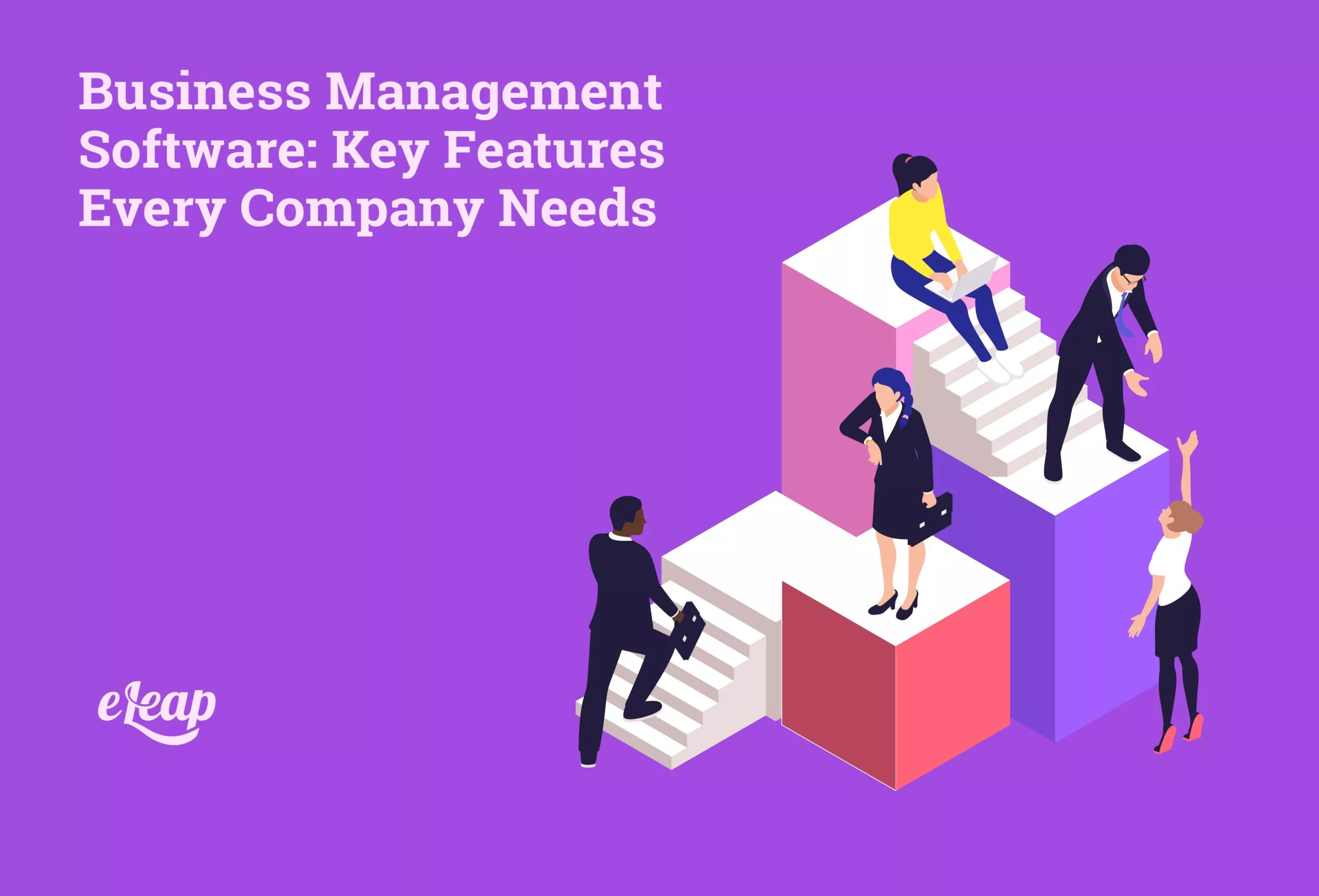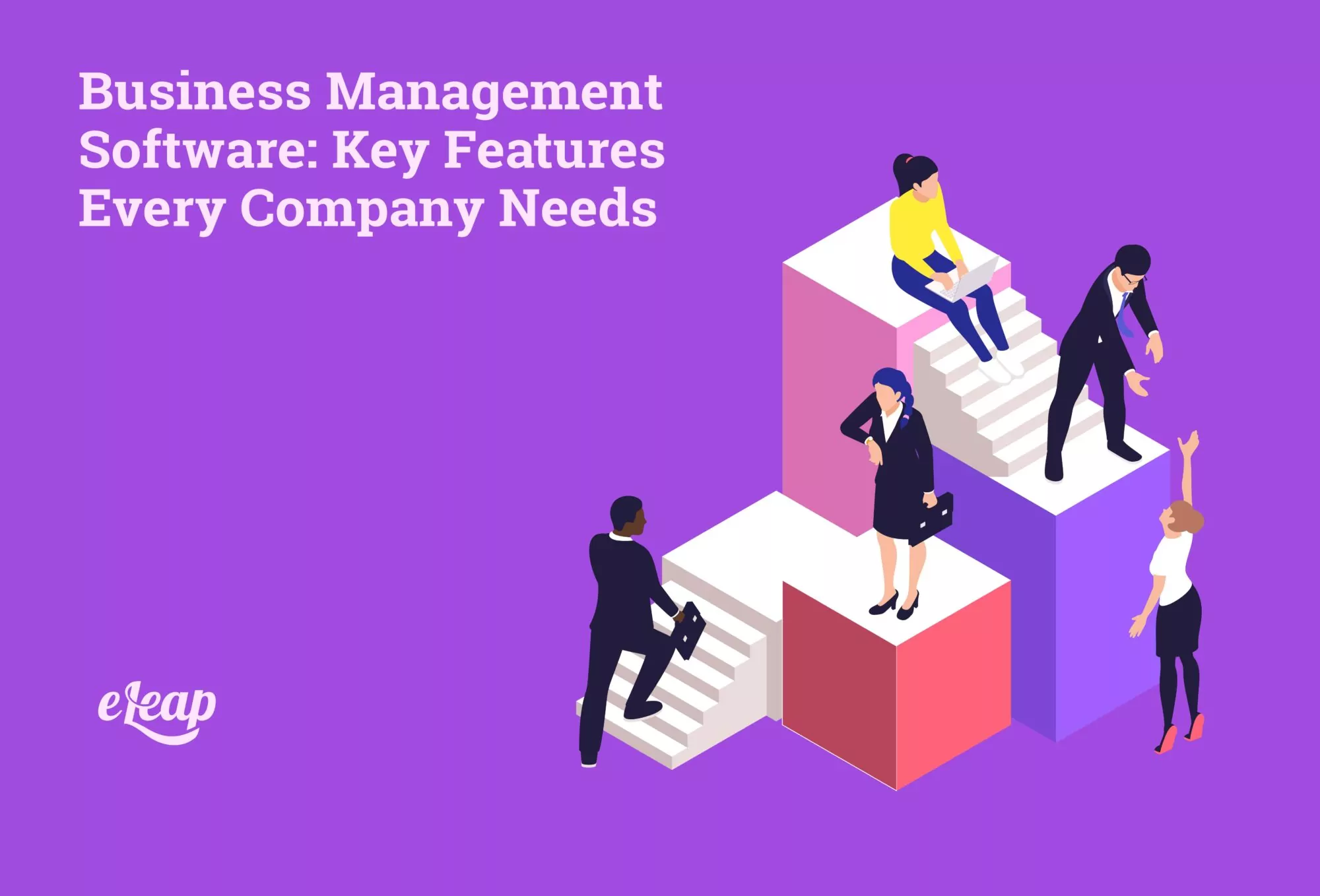Business Management Software: Key Features Every Company Needs

Business management software serves as the digital backbone for organizations, integrating various operational processes into unified platforms that eliminate data silos and boost productivity. Understanding essential features helps companies select business management software solutions that drive measurable growth and operational efficiency. Explore how eLeaP®’s Performance Management Platform can simplify evaluations, boost productivity, and drive quantifiable results.
Unlike standalone applications, business management software provides centralized dashboards that unify departmental tools into cohesive ecosystems. Modern business management software typically operates through cloud-based platforms, offering superior scalability, accessibility, and lower upfront costs compared to traditional on-premises solutions.
Core Administrative and Security Features
User Management and Access Controls
Effective business management software includes comprehensive user management systems that control access permissions based on specific roles and responsibilities. These security protocols ensure that sensitive business data remains protected while enabling authorized team members to access the information necessary for daily operations.
Advanced business management software incorporates role-based permissions that automatically adjust user capabilities as employees change positions or departments, maintaining security integrity across organizational restructuring.
Data Security and Backup Systems
Enterprise-grade business management software must incorporate robust security protocols, including encrypted data storage, automatic backup systems, and disaster recovery capabilities. These features protect valuable business information from cyber threats while ensuring business continuity in the event of unexpected disruptions.
Leading business management software solutions also provide compliance support for regulations like GDPR and HIPAA, automatically generating audit trails and maintaining data governance standards required by various industries.
Customizable Dashboards and Real-Time Analytics

Quality business management software offers customizable dashboards that display key performance indicators relevant to specific user roles and departments. These visual interfaces enable managers to monitor business metrics, track progress toward objectives, and pinpoint areas that require immediate attention.
Real-time analytics within business management software transform raw operational data into actionable insights, enabling data-driven decision-making that improves competitive positioning and strategic planning capabilities.
Financial Management and Accounting Integration
Comprehensive Accounting Capabilities
Modern business management software includes integrated accounting modules that handle invoicing, expense tracking, accounts payable, accounts receivable, and comprehensive financial reporting. This integration eliminates duplicate data entry while ensuring financial records remain accurate across all business operations.
Advanced business management software provides automated reconciliation features that match transactions across multiple accounts, reducing manual bookkeeping tasks and minimizing human errors in financial record-keeping.
Budget Tracking and Financial Forecasting
Sophisticated business management software offers budget management tools that track expenses against allocated budgets, generating financial forecasts based on historical data and predictive analytics. These capabilities help businesses maintain fiscal responsibility and identify potential cash flow issues before they impact operations.
Integrated business management software enables scenario planning through financial modeling tools that project outcomes based on different business decisions, supporting strategic planning and risk management initiatives.
Automated Invoice and Payment Processing
Efficient business management software streamlines billing processes through automated invoice generation, payment tracking, and integration with popular payment processors, including PayPal, Stripe, and traditional banking systems. These features accelerate cash flow while reducing the administrative overhead associated with manual billing procedures.
Project Management and Team Collaboration
Advanced Project Planning Tools
Robust business management software features comprehensive project management capabilities, enabling teams to plan projects effectively using Gantt charts, Kanban boards, and timeline views. These tools help businesses deliver projects on time while maintaining budget constraints and ensuring efficient resource allocation.
Professional business management software incorporates critical path analysis and resource leveling features that optimize project schedules and prevent resource conflicts across multiple concurrent projects.
Task Assignment and Progress Tracking
Effective business management software facilitates task delegation through assignment features that automatically notify team members of responsibilities, deadlines, and priority levels. Progress tracking capabilities help managers monitor task completion rates and identify potential bottlenecks before they impact project timelines.
Modern business management software includes time tracking integration that captures actual work hours against estimated durations, thereby improving the accuracy of future project planning and resource allocation decisions.
Enhanced Team Collaboration Features
Contemporary business management software incorporates collaboration tools, including shared workspaces, comment systems, file sharing capabilities, and video conferencing integration. These features enable seamless communication between team members, regardless of physical location or time zone.
Advanced business management software provides workflow automation that routes approvals, notifications, and updates according to predetermined business rules, thereby reducing manual coordination tasks and enhancing process consistency.
Customer Relationship Management Integration
Comprehensive Contact and Lead Management
Quality business management software includes integrated CRM functionality that centralizes customer information, tracks interaction history, and manages lead progression through customizable sales pipelines. These features help businesses nurture relationships and convert prospects into loyal customers through systematic follow-up processes.
Enterprise business management software offers lead scoring capabilities that automatically prioritize prospects based on engagement levels, demographic data, and behavioral patterns, allowing sales teams to focus their efforts on the highest-probability opportunities.
Sales Pipeline and Opportunity Tracking
Advanced business management software offers visual sales pipeline management, tracking opportunities from initial contact through deal closure, including probability assessments and revenue forecasting. This visibility enables sales teams to prioritize their efforts effectively, providing accurate revenue projections for informed business planning.
Sophisticated business management software includes sales analytics that identify conversion patterns, average deal sizes, and sales cycle durations, enabling continuous improvement in sales processes and team performance.
Customer Communication and Marketing Automation
Integrated business management software features include communication tools that log customer interactions, schedule automated follow-ups, and execute targeted marketing campaigns based on customer segmentation criteria. These tools ensure consistent customer experiences while maintaining strong relationships over time.
Inventory and Supply Chain Management
Advanced Stock Tracking and Control
Comprehensive business management software includes inventory management capabilities that track stock levels across multiple locations, monitor product movement, and generate automatic reorder alerts when inventory reaches predetermined thresholds. These features prevent stockouts while reducing carrying costs and obsolete inventory.
Professional business management software offers inventory valuation methods, including FIFO, LIFO, and weighted average costing, ensuring accurate financial reporting and effective cost management across various product categories.
Resource Allocation and Optimization
Effective business management software helps optimize resource utilization by allocating resources efficiently, matching available resources with project requirements, and preventing conflicts across multiple concurrent initiatives. This functionality ensures optimal productivity while maintaining quality standards.
Supply Chain Integration and Procurement
Modern business management software connects with suppliers and vendors through integrated procurement systems that streamline ordering processes, track deliveries, and manage vendor relationships. These integrations enhance supply chain efficiency, reduce procurement costs, and minimize delivery delays.
Advanced business management software features supplier performance tracking, which monitors delivery times, quality metrics, and pricing trends, thereby supporting strategic sourcing decisions and vendor negotiations.
Analytics, Reporting, and Business Intelligence
Real-Time Performance Monitoring
Leading business management software provides comprehensive analytics that transform operational data into strategic insights, helping businesses identify trends, measure performance against benchmarks, and make informed decisions that drive competitive advantages.
Modern business management software incorporates predictive analytics capabilities, powered by artificial intelligence and machine learning algorithms, that forecast demand, identify risks, and recommend optimal business strategies.
Customizable Reporting and KPI Tracking
Advanced business management software provides flexible reporting capabilities, enabling users to create custom reports tailored to specific business requirements and stakeholder needs. These reporting tools help decision-makers access relevant information in formats that support strategic planning processes.
Quality business management software features automated report distribution, delivering critical business metrics to stakeholders on predetermined schedules, ensuring consistent communication and accountability across organizational levels.
Integration Capabilities and Scalability
Third-Party Software Integration
Comprehensive business management software includes extensive integration capabilities that connect with existing business applications, including email systems, accounting software, e-commerce platforms, and industry-specific tools. These integrations create seamless workflows while eliminating data duplication across platforms.
Modern business management software supports API integration, enabling custom connections with proprietary systems and specialized applications. This process ensures complete operational integration, regardless of the existing technology infrastructure.
Mobile Accessibility and Remote Work Support
Contemporary business management software provides native mobile applications that enable users to access critical business information and perform essential tasks from smartphones and tablets. This mobility ensures business operations continue regardless of location constraints or remote work requirements.
Scalable Architecture for Growth
Quality business management software offers a scalable architecture that accommodates business growth without requiring complete system replacements or significant disruptions. This scalability ensures long-term value while preventing costly migrations as organizations expand.
Enterprise-grade business management software features modular functionality that enables businesses to add features and capabilities as their needs evolve, ensuring a maximum return on investment throughout various stages of organizational growth.
Implementation Considerations and Best Practices
Overcoming Common Implementation Challenges
Successful business management software deployment requires addressing potential obstacles, including employee resistance to change, complex data migration from legacy systems, and integration challenges with existing technology infrastructure. Organizations should adopt phased rollout strategies that minimize disruption while ensuring comprehensive user adoption.
Effective business management software implementation includes comprehensive training programs, ongoing support resources, and feedback mechanisms that ensure a successful transition and optimal utilization of platform capabilities.
Vendor Selection and Evaluation Criteria
Choosing the right business management software requires a careful evaluation of current business needs, growth projections, budget constraints, and technical requirements. Organizations should prioritize business management software vendors that offer proven track records, comprehensive support services, and flexible pricing models.
Leading business management software providers offer demonstration periods, pilot programs, and customization services that enable organizations to validate the platform’s suitability before making long-term commitments.
Future Trends in Business Management Software
Artificial Intelligence and Automation
Next-generation business management software incorporates artificial intelligence capabilities that automate routine tasks, provide predictive insights, and optimize business processes without human intervention. These intelligent features enhance operational efficiency while reducing manual workload across departments.
Industry-Specific Customization
Advanced business management software is increasingly offering vertical-specific solutions tailored to the unique requirements of industries such as healthcare, construction, education, and others. These customized platforms provide industry-relevant features while maintaining comprehensive business management functionality.
No-Code and Low-Code Development
Modern business management software platforms feature no-code and low-code development tools that enable non-technical users to create custom workflows, applications, and integrations without requiring programming expertise, thereby democratizing software customization across organizations.
Maximizing Business Management Software ROI
Selecting optimal business management software requires striking a balance between comprehensive functionality and a user-friendly interface that encourages adoption across all organizational levels. The most effective business management software solutions combine essential features with an intuitive design that minimizes training requirements while maximizing productivity gains.
Companies should prioritize business management software that demonstrates measurable returns on investment through improved efficiency, reduced operational costs, and enhanced decision-making capabilities. The ideal business management software grows with organizations, adapts to changing requirements, and provides sustainable competitive advantages in dynamic markets.
By focusing on these comprehensive features and best practices for implementation. Businesses can select business management software that transforms operations, enhances collaborative capabilities, and positions organizations for sustained growth and profitability in competitive business environments.
Conclusion
Business Management Software has evolved into a vital asset for organizations seeking streamlined operations, enhanced collaboration, and sustainable growth. From automating mundane tasks to delivering strategic insights, BMS offers unparalleled advantages across departments and industries.
Selecting the right platform requires a careful evaluation of your business’s needs, goals, and available resources. Whether it’s the all-in-one efficiency of Zoho One, the task-focused functionality of Monday.com. Or the learning-integrated model of eLeaP, the right tool can be a game-changer.
Now is the time to invest in a solution that not only meets today’s challenges but also prepares your team for tomorrow’s opportunities.